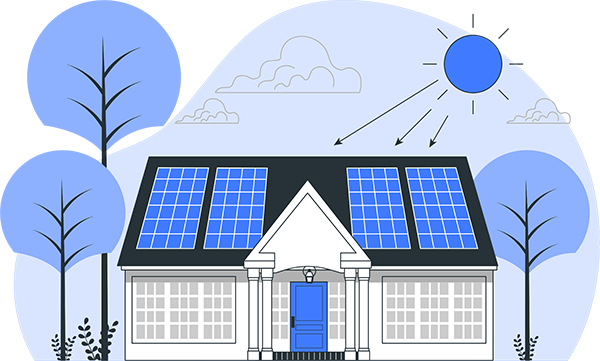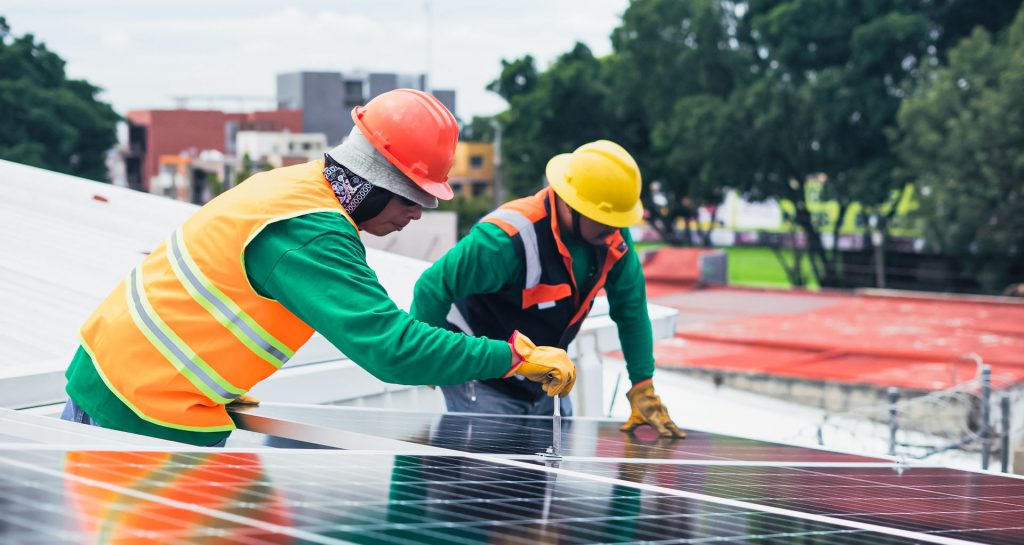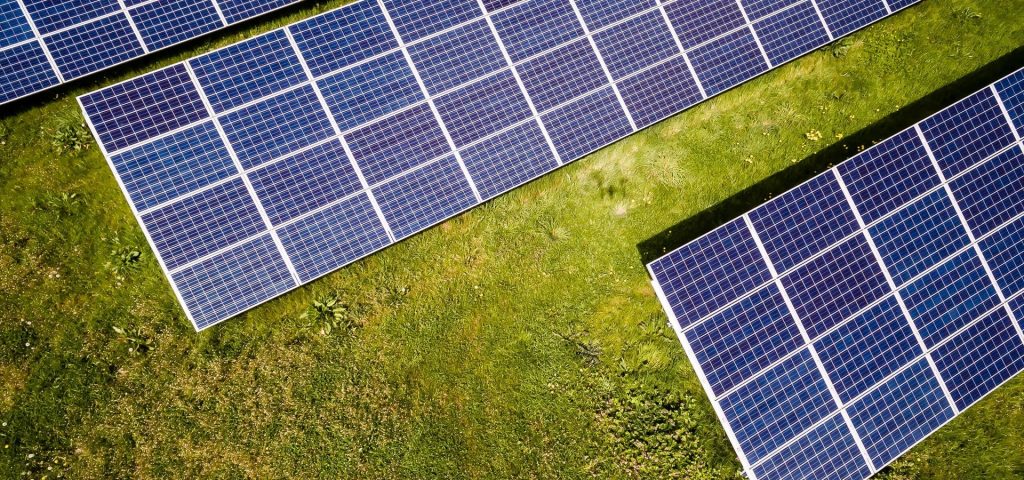It’s no secret that solar power is the wave of the future, and many homeowners are looking for ways to take advantage of it. But what about battery storage? Does it have an impact on how you power your Phoenix solar roofing system? The answer is a resounding yes! Battery storage can be incredibly beneficial for those who use solar power in Phoenix, and this article will explore why.
Battery storage can provide reliable backup electricity during outages, allowing you to stay powered even when the sun isn’t shining. It also increases energy efficiency by reducing peak demand charges and helping to stabilize the grid. Finally, battery storage can help you save money in the long run by allowing you to store excess energy generated during the day for use at night or during times of low sunlight.
Definition Of Battery Storage
Battery storage systems are becoming increasingly popular in the renewable energy market. They’re a way to store energy that has been generated by solar panels and other sources, so it can be used when needed instead of being wasted. This is especially important for Phoenix Solar Roofing Systems, as solar energy is often abundant during daylight hours but not at night or in other situations where energy may be needed. By storing excess energy from the sun, battery storage systems can provide an extra layer of reliability and flexibility to these systems.
The most common type of battery storage system used in Phoenix Solar Roofing Systems is lithium-ion batteries, which offer significant advantages over other technologies due to their long lifespan and high capacity. Lithium-ion batteries are also relatively lightweight and compact compared to other types of batteries, making them a great choice for rooftop installations. Additionally, these batteries offer excellent charging and discharging capabilities, allowing them to quickly store and release large amounts of electricity.
In terms of how much impact battery storage has on Phoenix Solar Roofing Systems, it is clear that they are invaluable components in ensuring reliable power delivery and providing additional energy when needed. By allowing users to store excess energy from the sun when it’s available and then release it when needed, battery storage systems help ensure consistent access to power for consumers utilizing Phoenix Solar Roofing Systems. In addition to this, the cost savings associated with the use of such systems make them an attractive option for those looking for a more cost-effective way to take advantage of solar power.
Benefits Of Battery Storage For Phoenix Solar Roofing Systems
Battery storage is becoming increasingly popular as a way of storing energy in order to use it later. This has numerous advantages for Phoenix solar roofing systems, in terms of both convenience and cost.
One major benefit of battery storage is that it enables the user to store excess energy produced by their solar roofing system. This means that instead of selling the excess energy back to the grid at a lower rate, they can store it and use it when they need extra power. This helps to save money on electricity bills and ensures that any surplus power generated doesn’t go to waste.
Another advantage of battery storage is its ability to provide backup power during power outages or bad weather conditions. By using batteries, users can be assured that their solar roofing system will still be able to generate enough power even during periods when there isn’t much sunshine. This adds an extra layer of security for those who rely on solar energy for their home or business needs.
In addition, batteries also make it easier for users to manage their energy usage more efficiently as they can monitor how much energy they are using in real time. This allows them to adjust accordingly and ensure that no energy goes unused – helping them get the most out of their solar roofing system.
Overview Of Different Types Of Battery Storage Systems
When it comes to battery storage systems, there are a few different types to consider. The most common type of battery storage system is a lead-acid battery. This type of battery is the oldest and most affordable, but has limited life expectancies and requires more maintenance than other options. Lithium-ion batteries are becoming increasingly popular for their longer life spans, greater efficiency, and lower maintenance requirements. They also tend to be more expensive than lead-acid batteries. Lastly, flow batteries offer some additional benefits over the other two types and can be used in situations where lithium-ion batteries may not be suitable due to their high cost or size constraints.
By utilizing a battery storage system with Phoenix Solar Roofing Systems, homeowners can benefit from increased energy efficiency and reduced costs associated with the need for grid electricity for peak power demands. This means that homeowners will save money on their monthly electricity bills while also taking advantage of solar energy when the sun is not shining during peak demand periods. Additionally, having a battery storage system in place ensures that households have access to reliable energy even when the grid goes down due to inclement weather or power outages.
So, if you’re looking for ways to save money on your monthly electricity bill while also taking advantage of solar energy when the sun isn’t shining – investing in a battery storage system could be the perfect solution for your Phoenix Solar Roofing System needs! Not only does this provide you with reliable access to power during peak demand periods, but it also helps reduce your reliance on grid electricity – ultimately saving you money in the long run.
Cost Of Battery Storage For Phoenix Solar Roofing Systems
When it comes to the cost of battery storage for Phoenix solar roofing systems, it’s important to consider all the different factors that go into the equation. Generally speaking, the cost of a battery storage system will depend on several factors like its size, capacity, and type. Additionally, installation costs, warranties and financing options can also affect the total cost of a battery storage system.
So how much does a battery storage system for Phoenix solar roofing systems actually cost? Well, it really depends on the specific requirements for an individual household or business. Generally speaking, though, a basic lithium-ion battery storage system may start at around $2,000 and can range up to $7,000 or more depending on its capacity and other features.
Although there are some upfront costs associated with installing battery storage systems in Phoenix solar roofing systems, many homeowners find that they save money in the long run because they’re able to store energy when it’s most efficient (like during peak hours) and use it when they need it most. As with any investment decision, be sure to carefully weigh all your options before making any final decisions about purchasing a battery storage system for your home or business.
Installation Requirements For Battery Storage
Battery storage is an increasingly popular choice for solar roofing systems in Phoenix. As such, it’s important to understand the installation requirements.
First, it’s essential that the battery storage unit and all of its components are compatible with the existing electrical system of the home or building. The exact requirements will depend on the type of system being used, and should be evaluated by a qualified electrician before installation. Additionally, local building codes must be followed to ensure the safety and legality of any installation.
In terms of physical installation itself, there must be adequate space to correctly position the battery storage unit, as well as other necessary components. The modular nature of most battery systems allows for some flexibility in placement, but careful consideration should be taken when deciding where this equipment will reside. Furthermore, wiring between the components and other parts of the system must be done properly to ensure proper operation and safety protocols are followed.
Overall, appropriate installation is key when incorporating battery storage into Phoenix solar roofing systems. It’s critical to consider compatibility with existing electrical systems, adhere to local building codes and regulations, provide adequate space for placement, and take care when wiring components together. Doing so ensures an efficient and safe setup that can maximize the benefits offered by battery storage technology.
Environmental Impact Of Battery Storage
The environmental impact of battery storage is an important factor to consider when deciding whether or not to install a Phoenix Solar Roofing System. The potential impacts range from the emissions associated with producing and disposing of batteries, to their effects on noise levels and wildlife habitats.
The production process for batteries can create large amounts of air pollution, as well as hazardous waste. Similarly, disposing of old batteries can also have significant impacts on the environment, due to their toxic materials and potentially hazardous by-products. To mitigate these issues, it is important that manufacturers source materials responsibly and properly dispose of used batteries.
Overall, battery storage has the potential to increase solar energy usage across many households, while reducing reliance on traditional energy sources. This could have a positive effect on the environment if implemented in the right way. However, careful consideration must be taken before installation to ensure that any negative environmental impacts are minimized or avoided altogether.
Regulations And Safety Considerations For Battery Storage
As battery storage technology becomes increasingly popular, safety considerations and regulations become more important. Specifically, when it comes to Phoenix Solar Roofing Systems, understanding the regulations and safety considerations surrounding their battery storage is essential. To ensure that these systems are safe and effective for users, there are a few key elements to keep in mind.
First, the installation of any type of battery storage system must be done in accordance with all local building codes and regulations. This includes obtaining any necessary permits or licenses before commencing work on the project. Additionally, proper maintenance and periodic inspections should be conducted to ensure that the system is working properly.
Finally, proper safety protocols should also be followed during installation and use of battery storage systems. This includes wearing protective gear such as gloves or eye protection when handling components, as well as making sure that all electrical connections are secure and free from corrosion. All components should also be properly labeled so that they can easily be identified if a problem arises. Following these simple steps can help make sure that Phoenix Solar Roofing Systems remain safe for users for years to come.

Challenges Of Battery Storage For Phoenix Solar Roofing Systems
When it comes to battery storage for Phoenix solar roofing systems, there are certain challenges that need to be addressed. These challenges can range from the cost of installation and maintenance to meeting safety regulations. In this section, we’ll explore these issues in more detail.
The first challenge is the cost of battery storage. This can be a significant expense up-front, especially if you’re getting a large system installed. Not only do you have to purchase the batteries but also pay for their installation and ongoing maintenance costs. It’s important to consider all of these expenses before investing in such an expensive technology.
Another challenge relates to meeting safety regulations. When it comes to electricity and solar power, there are strict guidelines that must be followed in order to ensure public safety. This includes having all necessary permits and certifications for any equipment used in your system, like batteries or inverters. It’s important to do your research ahead of time and make sure you’re adhering to all applicable regulations before installing your system.
Overall, battery storage for Phoenix solar roofing systems presents unique challenges that must be taken into account when considering such an investment. From financial considerations to regulatory compliance, there are many factors that should be considered before taking on such a project. By understanding these issues up-front, you can ensure that your system is both safe and cost-effective in the long run.
Advantages Of Battery Storage For Phoenix Solar Roofing Systems
Battery storage can provide a number of advantages when it comes to Phoenix Solar Roofing Systems. First and foremost, battery storage helps to reduce energy costs. By storing excess energy during periods of high production, the system can use that stored energy during times when solar production is lower or non-existent, eliminating the need to purchase electricity from the grid. This can result in significant savings over time.
Another advantage of using battery storage with Phoenix Solar Roofing Systems is improved reliability. Having an energy source stored allows the system to continue functioning even during power outages or other events that cause an interruption in service from the grid. This allows homeowners to remain powered up and connected even in emergency situations.
Finally, battery storage also provides a great way for users to go green by reducing their carbon footprint. Since energy is not being purchased from the grid, fewer emissions are created from traditional power sources such as coal-fired plants and other sources of fossil fuels. This makes it easier for homeowners to lower their environmental impact while still enjoying reliable solar power.
Future Of Battery Storage For Phoenix Solar Roofing Systems
The future of battery storage for Phoenix Solar Roofing Systems is certainly promising. With the current trends in renewable energy, it’s no surprise that more businesses are looking to add batteries to their system. Batteries can provide a reliable source of power during peak demand times and can be used as a backup in case of an outage. Additionally, they can offer customers the ability to store excess energy generated by the solar roofing systems and use it later when needed.
The increased adoption of battery storage means that Phoenix Solar Roofing Systems will continue to benefit from their cutting-edge technology. Not only do they have access to more efficient components, but they also have access to the latest advancements in battery storage solutions. They’ll be able to use this technology to make their systems even more efficient and reliable. Furthermore, the cost savings associated with battery storage could help reduce customer bills and increase profits for Phoenix Solar Roofing Systems.
As we move into a clean energy future, battery storage solutions are likely to become even more important for Phoenix Solar Roofing Systems. With more businesses relying on renewable energy sources, solutions like these will play an increasingly essential role in helping them meet their energy needs and achieve energy independence. It’s clear that this technology has tremendous potential for improving efficiency and reducing costs – making it an invaluable asset for any business interested in renewable energy sources.



